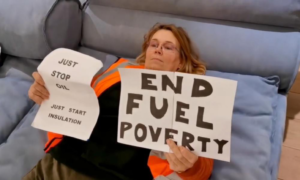Nonprofits that have long led race and equity programs in the community are now pivoting to look inward, boosting diversity efforts amid the global racial reckoning after George Floyd’s murder.
At Greater Twin Cities United Way, one of the state’s largest social services nonprofits, leaders are adding training on diversity, equity and inclusion for employees and opening jobs to applicants without a college degree.
In June, board members and staffers will begin a nine-month “equity journey” focused on “racial reconciliation.” The new measures follow a significant turnover of employees of color, who constituted 43% of the employees leaving the nonprofit in the past two years, according to the organization.
The Twin Cities United Way is “actively, continuously and humbly building our capacity to create equity, justice and inclusion inside and outside of our organization,” CEO John Wilgers and board chairwoman Dorothy Bridges said in a statement.
Across Minnesota, many nonprofits and foundations are boosting the number of people of color on staff, in leadership roles, on boards and in volunteer ranks. As in government and business, however, these initiatives are often met with challenging realities.
Some current and former employees at United Way describe a workplace that made them uncomfortable.
Lynette Commodore, who is Black, left United Way in 2019 after two years, frustrated by white colleagues who she said repeatedly touched her hair. She felt she had to constantly educate white peers on Black culture.
“It was a racially hostile environment,” she said. “My hair was a major source of curiosity for my white colleagues. … I’ve never had people touch my hair so much in an office.”
Commodore said she shared concerns with supervisors and an employee group, but nothing changed.
“It never seemed to be intentionally malicious, it was just ignorance,” said Commodore, who left to start a business. “There are a lot of things that were so subtle … but it made work an uncomfortable environment.”
‘Transformational journey’
United Way isn’t the only Twin Cities nonprofit to boost its internal diversity efforts.
Catholic Charities of St. Paul and Minneapolis is looking to hire a full-time director to oversee its racial equity and social justice work. Of more than 500 employees, 52% are people of color even though 70% of clients are nonwhite.
When Derek Chauvin was being tried in the death of George Floyd, managers started meeting twice a week to talk about how they could better support staffers — especially employees of color — during the often traumatic court proceedings.
“Our organization is all about social justice. … It requires some additional intentionality and investment,” said CEO Michael Goar, who made history this year as the first person of color in Catholic Charities’ top job in its 150 years. “This is sort of a transformational journey and you’re not going to change it overnight.”
Last summer, board members at the Douglas Dayton YMCA in Minneapolis urged the parent YMCA of the North to address systemic racism. Since then, the Y has held listening sessions, started an advisory team with employees of color and hired a “people and culture” executive.
In St. Paul, Wilderness Inquiry has long worked on building equity in the outdoors. But after Floyd’s death, the all-white staff launched an internal justice, equity, diversity and inclusion initiative, recruited more board members of color and analyzed pay inequities.
“We have a long way to go, as does everyone else,” said Kim Keprios, the executive director. “It’s important … to walk the talk.”
Employees at Beacon Interfaith Housing Collaborative in St. Paul are seeking to form a union in part to stem high turnover of people of color.
“Some amazing things are going on at Beacon, but we recognize that we can’t fix the systems that exist in the wider world if we haven’t fixed the systems that exist within Beacon as well,” said Craig Freeman, who’s leading the effort.
The Twin Cities United Way — one of the largest of about 1,800 United Ways nationwide — gives millions of dollars a year. It recently led a culturally specific food drive, and after Floyd’s death it joined the Minneapolis Foundation and St. Paul & Minnesota Foundation to help businesses damaged in the unrest and to reform the criminal justice system.
Retention a challenge
But 11 current and former United Way employees who spoke to the Star Tribune, six of whom are people of color, expressed concern about turnover of people of color and the lack of diversity in leadership. Eight declined to be named for fear of losing their job or facing backlash in the sector.
United Way leaders declined to comment on former employees but said 32% of board members and 30% of employees are people of color. In the past five years, the state Department of Human Rights has had one closed case involving United Way but didn’t find probable cause of racial discrimination. DAVID JOLES • STAR TRIBUNEJerrald Spencer Jr. filed an EEOC complaint after resigning from the Greater Twin Cities United Way in March.
Jerrald Spencer Jr. left United Way in March after 13 months. Spencer, who is Black, said he was offered severance, which he felt was retaliation for questioning leaders about race-related decisions. He resigned instead and has filed a complaint with the U.S. Equal Employment Opportunity Commission (EEOC).
Last year, United Way leaders rephrased a statement after Floyd’s death, saying he was “murdered” by police rather than “killed” after Spencer and others requested the change.
When Spencer asked for Juneteenth as a paid holiday, United Way initiated flex holidays employees can take when they want, he said. Spencer said he confronted Wilgers when he called him by the wrong name, for which Wilgers apologized.
“I’ve done nothing wrong here,” Spencer said. “I’ve only brought up things that have either hurt me, hurt other people or things that could have been approached differently or made us look more intentional when we’re trying to change as an organization.”
Drew Coursin quit in October after three years at United Way. Coursin, who is white, said the nonprofit paid “lip service to equity” because it had mostly white leaders.
“We hold out nonprofits, specifically United Way, as defenders of equity, as champions for underrepresented populations … and yet they can’t retain persons of color,” he said.
Employees are often wary of speaking up for fear of hurting a nonprofit’s mission, said Lisa Bowman of Atlanta, a former executive at United Way Worldwide in Alexandria, Va., who filed an EEOC complaint over retaliation she said she faced for reporting sexual misconduct there. But she said donors and board members need to know.
“If you think about what’s happening in our country, we’re having a breakdown to some extent of all the trusted institutions,” she said. “And sort of the last frontier of that is the nonprofit sector. Those are the people that we all trust to do good and do the right thing.”




